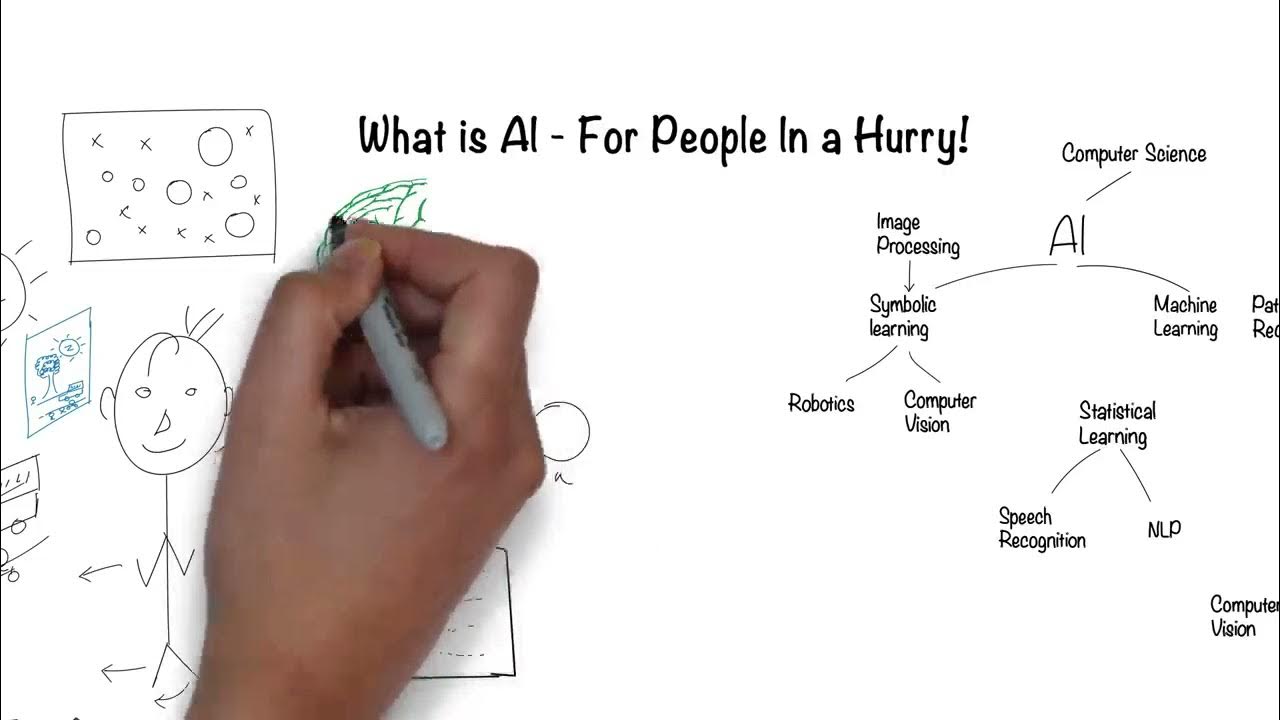Subjective Answers Evaluation Using Machine Learning
Summary
TLDRThis video script introduces a machine learning project for subjective answer evaluation using natural language processing (NLP). The project aims to develop an AI system capable of automatically grading answer sheets with high accuracy. The proposed method involves training an RCN (Regional Conversion Neural Network) to understand various topics and grammatical structures, then evaluating answers based on similarity to correct responses and grammatical correctness. The project promises an accuracy of 97-98%, surpassing traditional manual grading methods, and includes a demonstration of the system in action, showcasing its ability to analyze and score answers in real-time.
Takeaways
- 😀 The video discusses a project on subjective answer evaluation using machine learning, aiming to develop an automated system for grading answer sheets.
- 🧠 The project leverages Natural Language Processing (NLP) to understand various topics, grammatical structures, and sentence formations, which are then used to form intelligent evaluations.
- 📈 The project's goal is to achieve an accuracy of 97-98% in evaluating answers, which is higher than the previously achieved 88%.
- 🌐 The project is based on a paper from IW 2022 and uses a Regional Conversion Neural Network (RCN) as part of the proposed system.
- 📑 The abstract mentions a novel approach using machine learning and NLP to evaluate answers automatically without human intervention, relying on training data and NLP models.
- 🛠️ The project provides a detailed explanation of the process and algorithms upon purchase, including the training and evaluation phases.
- 🔍 The existing system is criticized for being manual, time-consuming, and prone to human error, which the proposed system aims to address.
- 📝 The project's architecture involves extracting keywords from raw data, training the model, and then evaluating the answers based on similarity and grammatical correctness.
- 💻 The project is implemented using Python and requires Anaconda for running the main code.
- 📊 The dataset used for training covers various topics across domains such as computer science, physics, mathematics, and finance.
- 📈 The project demonstrates high testing accuracy of 99% and training accuracy of 98%, outperforming existing systems.
Q & A
What is the main focus of the project discussed in the video?
-The project focuses on subjective answer evaluation using machine learning and natural language processing (NLP) to automatically correct and evaluate answer sheets with high accuracy.
What does the project aim to achieve in terms of accuracy?
-The project aims to achieve an accuracy of approximately 97 to 98 percent, which is higher than the previously reported 88 percent.
What is the significance of using NLP in this project?
-NLP is significant because it enables the system to understand various topics, grammatical structures, and sentence formations, which are crucial for intelligently evaluating the content of answer sheets.
What is the proposed system in the project's algorithm?
-The proposed system in the project's algorithm is the Regional Conversion Neural Network (RCN).
How does the project handle the evaluation of subjective answers?
-The project evaluates subjective answers by comparing the keywords and content of the student's answers with the original answers, checking for similarity and grammatical correctness, and then assigning scores accordingly.
What is the process involved in training the model for this project?
-The training process involves feeding the model with various topics and content from different domains to teach it the nuances of language and the correct answer patterns.
How does the project handle the detection of grammatical errors?
-The project detects grammatical errors by checking the student's answers against the original answers and the trained data, identifying discrepancies and assigning marks based on the correctness of grammar and spelling.
What is the role of the dataset in this project?
-The dataset plays a crucial role as it contains various titles, abstracts, and answers from different domains, which the model uses to learn and evaluate answers accurately.
How does the project ensure the evaluation is unbiased and consistent?
-The project ensures unbiased and consistent evaluation by relying solely on the trained data and machine learning algorithms, eliminating human intervention and potential errors.
What are the potential benefits of using this project for evaluating answer sheets?
-The potential benefits include saving time, reducing the likelihood of human error, providing consistent evaluation, and offering a more scalable solution for handling large volumes of answer sheets.
How can one access or purchase the project for further use?
-Interested parties can access or purchase the project by contacting iwexpert.com, with the project being offered at around 4000 rupees, including company documentation.
Outlines

Dieser Bereich ist nur für Premium-Benutzer verfügbar. Bitte führen Sie ein Upgrade durch, um auf diesen Abschnitt zuzugreifen.
Upgrade durchführenMindmap

Dieser Bereich ist nur für Premium-Benutzer verfügbar. Bitte führen Sie ein Upgrade durch, um auf diesen Abschnitt zuzugreifen.
Upgrade durchführenKeywords

Dieser Bereich ist nur für Premium-Benutzer verfügbar. Bitte führen Sie ein Upgrade durch, um auf diesen Abschnitt zuzugreifen.
Upgrade durchführenHighlights

Dieser Bereich ist nur für Premium-Benutzer verfügbar. Bitte führen Sie ein Upgrade durch, um auf diesen Abschnitt zuzugreifen.
Upgrade durchführenTranscripts

Dieser Bereich ist nur für Premium-Benutzer verfügbar. Bitte führen Sie ein Upgrade durch, um auf diesen Abschnitt zuzugreifen.
Upgrade durchführenWeitere ähnliche Videos ansehen

Pengenalan Natural Language Processing dan Penerapannya | E-Learning AI

Natural Language Processing In 5 Minutes | What Is NLP And How Does It Work? | Simplilearn

Introduction to Generative AI

What is NLP & How Does It Work? Neuro Linguistic Programming Basics

How I'd Learn NLP in 2024 (If I Had to Start Over)

Artificial Intelligence (AI) for People in a Hurry
5.0 / 5 (0 votes)
